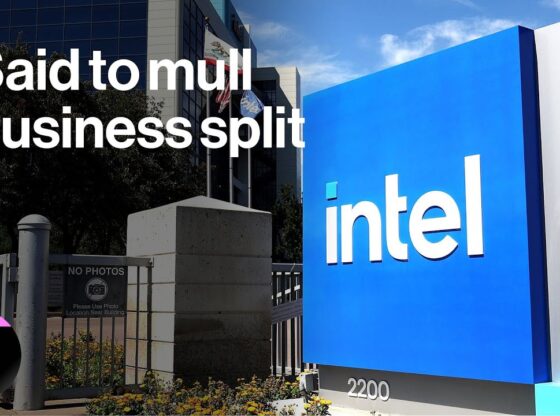The landscape surrounding Intel Corporation (NASDAQ:INTC), a prominent but currently struggling American chip manufacturer, is becoming increasingly complex, with potential scenarios emerging that could significantly reshape the company’s structure. According to a report published by the Wall Street Journal, citing sources familiar with the situation, two of Intel’s major rivals, Taiwan Semiconductor Manufacturing Company (NYSE:TSM) and Broadcom Inc. (NASDAQ:AVGO), are exploring potential deals that could lead to a significant restructuring of Intel, potentially splitting the company into two distinct entities.
The Wall Street Journal report indicates that Broadcom has been meticulously analyzing Intel’s chip design and marketing operations. However, Broadcom’s interest in a potential acquisition is contingent upon securing a partner to take on Intel’s manufacturing division. Essentially, Broadcom appears to be considering acquiring the design and marketing arm of Intel, but only if a suitable entity can be found to manage the capital-intensive and complex chip fabrication facilities.
On a separate front, TSMC, the world’s leading contract chip manufacturer, is reportedly considering taking over the operation of all of Intel’s chip manufacturing plants. This could potentially be structured in various ways, including TSMC leading an investor consortium or through some other form of partnership or acquisition. TSMC’s potential involvement underscores the significant challenges Intel faces in its manufacturing division, and the potential value that TSMC’s expertise could bring.
These discussions with potential suitors are reportedly being spearheaded by Intel’s executive chairman, Frank Yeary. The Wall Street Journal’s sources indicate that Yeary has communicated to associates that his primary focus is on maximizing shareholder value for Intel. This suggests that all options are on the table, and that a significant restructuring, including a potential split of the company, is being actively considered.
Neither Intel, Broadcom, nor TSMC immediately responded to requests for comment from Seeking Alpha regarding the Wall Street Journal’s report. The silence from these companies leaves much open to speculation, further fueling the ongoing discussion about Intel’s future.
Adding another layer of complexity to the situation, Reuters reported on Friday that the Trump administration may not be supportive of Intel’s chip plants being operated by a foreign entity. While the White House has consistently expressed support for foreign investment in the United States, it is considered “unlikely” that they would endorse a foreign company taking control of Intel’s manufacturing facilities. This stance from the Trump administration could potentially limit the options available to Intel, particularly concerning the involvement of a foreign company like TSMC.
Prior to the Wall Street Journal’s reporting, Bloomberg had previously reported that TSMC was evaluating the possibility of acquiring a controlling interest in Intel’s factories, allegedly at the request of the then-President. This earlier report further highlights the complex interplay between the involved companies and the potential influence of the U.S. government in this process.
Any potential deal involving Intel would require the explicit approval of the U.S. government, which has already invested billions of dollars in Intel through the CHIPS Act of 2022. Intel has been the largest single beneficiary of this $53 billion program, receiving up to $7.9 billion in subsidies to build new fabrication plants in Ohio, Arizona, and other locations within the U.S. This substantial government investment underscores the strategic importance of Intel to the U.S. semiconductor industry and the national security considerations at play.
Intel’s foundry business was initially established under the leadership of former CEO Pat Gelsinger, who implemented an ambitious turnaround plan for the company. However, Gelsinger was ultimately removed from his position last year after reportedly losing the confidence of the board. His departure highlights the internal challenges and leadership transitions that Intel has been navigating.
Intel’s current market capitalization stands at $102.19 billion, reflecting a significant decline of nearly 65% over the past five years. This decline underscores the challenges the company has faced in recent years. In stark contrast, TSMC boasts a current market capitalization of $840.25 billion, while Broadcom’s market capitalization is even higher at $1.09 trillion. These contrasting valuations further emphasize the diverging fortunes of these companies and the competitive pressures facing Intel.

